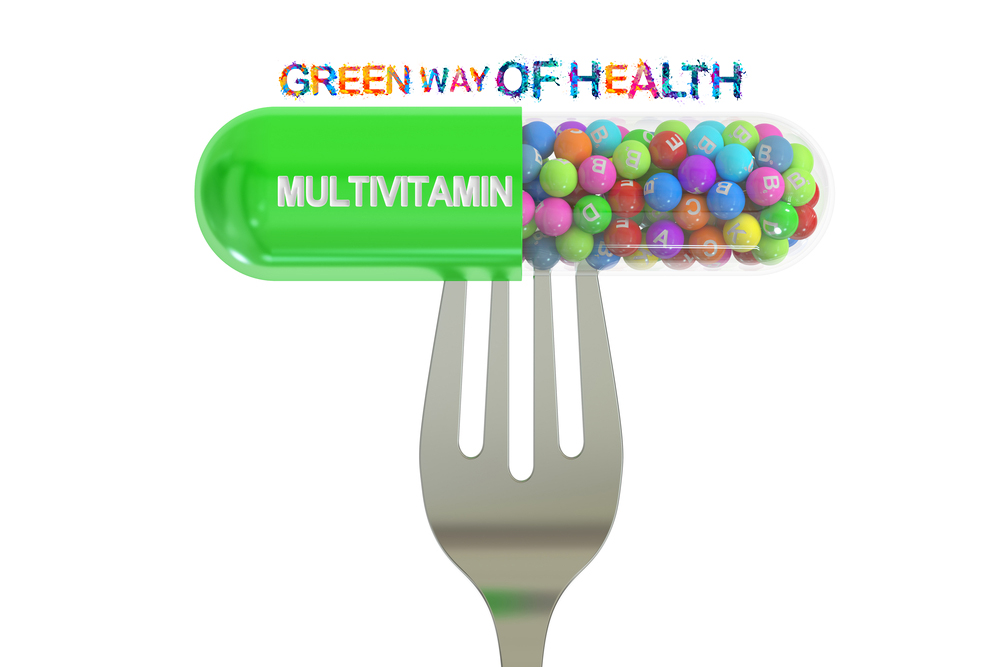
Men have higher nutrient needs when compared to women due to their larger size and greater muscle mass. Men also have a lot of demands on their time and energy, keeping up with work, family, and maybe a workout or two.
All these demands can really zap a man’s nutritional status. The stress being placed on men is impacting their health, as they have a pretty significantly lower overall life expectancy compared to women.
Men are also more likely to be diagnosed with common chronic illnesses such as diabetes or heart disease. Up to 70-89% of sudden heart attacks occur in men.
Not to mention, men also have prostate health issues to worry about. The bottom line is men need to take care of their health.
Here are a few supplements that might help support men’s health. Although these won’t work miracles, they can be one important piece of the overall health puzzle.

A Men’s Multivitamin
Be honest, on busy days your diet might be less than optimal. Sometimes you just hit the drive thru or convenience store for a quick meal or snack, although you know it’s not the best choice for your nutrition. But, a multivitamin specifically designed for men, can help fill in some of these nutrient gaps. Although a vitamin can never replace a healthy diet.
A tailored vitamin should address men’s different nutrient needs. For example, men need less iron, but more selenium than women, so a vitamin should take that into account.
There may be other benefits of a multivitamin specifically for men. A large 2012 study of over 14,000 men found that daily multivitamin use decreased the overall risk of cancer. They can also help keep your immune system functioning well, preventing colds and the flu.
How to Take a Multivitamin
Since men have different nutrient needs compared to women, it is best to choose a men’s specific multivitamin formula. Be sure that it includes a variety of vitamins and minerals, specifically the B-vitamins, vitamin C, vitamin D, magnesium, and selenium.
Your multivitamin does not need to provide 100% of all of these nutrients because you should be getting some from your diet, it is meant as more of a “safety net”. Try to choose one that is high quality and made by a reputable brand.

B-complex
Struggling with lack of energy and way too much stress? B-complex can help manage that stress and boost your energy. B-complex is made up of eight individual water-soluble vitamins that help the body use energy from food.
The vitamins included in B-complex are: B1, B2, B3, B5, B6, folate, B12, and biotin.
A deficiency in any of these vitamins significantly impacts our ability to manage stress, increasing oxidative stress and inflammation. When oxidative stress and inflammation are allowed to take over, this is when we feel exhausted and run down. It can also increase our risk of chronic diseases.
A 2011 study evaluated the use of B-complex vitamins and their impact on workplace stress. Sixty subjects received a high-dose vitamin B-complex or a placebo for three months. They were assessed for mood, anxiety, work demands, and personality. The B-complex group reported significantly lower personal stress and lower depression or poor mood after 12 weeks.
How to Take B-complex
B-vitamins are water-soluble, so there is no major risk of toxicity. You may find that your urine is neon yellow while taking the vitamins, but that is not dangerous.
Most multivitamins do have most of the B-vitamins you need, but you can always take a separate supplement if you really need some help with stress management.
B-vitamins are also readily found in many foods such as green leafy vegetables, animal proteins, and whole grains, so be sure to include those in your diet as well.

Coenzyme Q10
Coenzyme Q10 (CoQ10) is a naturally occurring substance in the body that has antioxidant properties and helps with energy production. But, as we age, coQ10 production decreases. Low levels of coQ10 may speed up the aging process, making you look worn down. It can also increase the risk of many diseases from cancer to Parkinson’s.
Statins are the most prescribed medication in the United States. Taking these medications to manage cholesterol levels, reduces coQ10 levels even further. Supplementing with coQ10 can help manage some of the common statin side effects, such as muscle pain. It has also been shown to lower risk of heart disease and improve heart function. Anyone taking a statin should also be taking a coQ10 supplement.
Another benefit for men’s health is that coQ10 can help maintain healthy sperm. A 2013 study found that supplementing with coQ10 improved sperm concentration and motility in infertile men.
How to Take CoQ10
There is no RDA for coQ10 because it is a compound the body makes itself. But, if you want to use it for heart or sperm health, then the recommended dosage is between 100-200 mg/day. Look for the ubiquinol form, which is best absorbed. Also, always take it with a meal. CoQ10 is fat-soluble, so it will be better absorbed with a bit of fat.

Omega-3 Fatty Acids
Omega-3s are fats that are essential for human health. The omega-3s, EPA, DHA, and ALA, must come from the diet. They are found in fish, flaxseeds, walnuts, and chia seeds.
The omega-3s are used for brain health, lowering inflammation, helping your mood, and lower risk of multiple diseases.
They are particularly important for men. An extensive review of 60 studies evaluating the benefits of omega-3s for men’s heath showed a significant link between lower risk of disease and omega-3 intake.
Omega-3s lowered cancer risk, including prostate and lung. They also lower risk of heart disease, the number one cause of death for men. Taking an omega-3 supplement is one of the best things a man can do for his health.
How to Take Omega-3s
There are many different types of omega-3 supplements on the market and they differ from where they are sourced. The main issue with fish oil has to do with contamination from heavy metals, such as mercury.
Choose fish oils made from small fish is less likely to be contaminated, since the fish are not able to store large quantities of toxins in their small bodies. Or you can consider an algal oil that is high in EPA and DHA, but is made from algae.
Algae is not as likely to be contaminated and is the only source of vegan EPA and DHA. As far as dosage, aim for 2-6 grams of fish oil per day, depending on your level of inflammation.

Lycopene
Lycopene is a carotenoid, similar to vitamin A. It is found in red and pink fruits and vegetables, such as tomatoes, and is responsible for their pretty color. Ketchup and other processed tomato products are the biggest source of lycopene for most people.
Lycopene is incredibly important for men’s health, particularly for the health of the prostate and overall sexual health. Lycopene helps blood vessels relax, which can improve blood flow to the penis. This may help lower the risk of erectile dysfunction or other sexual disorders that typically arrive with age.
A 2012 review evaluated the use of lycopene on the treatment of benign prostatic hyperplasia (BPH) which increases the risk of prostate cancer, the most common cancer among men. Across all eight studies, the use of lycopene supplements significantly decreased BPH and lowered the risk of prostate cancer diagnosis. Two of the studies also showed that lycopene decreased PSA levels, indicating a even greater decrease in the risk of developing prostate cancer.
How to Take Lycopene
The recommended dose for lycopene is 10-30 mg per day. There are no significant side effects noted. High doses may have the same impact as eating too many carrots, it could make your skin turn a golden orange color. It is also best to eat high lycopene foods, such as tomatoes, to get the most benefit.

Saw Palmetto
Saw palmetto is small shrub native to the United States and Europe. It has been used for its medicinal properties to treat urinary and reproductive problems for centuries.
The benefit for men’s health is that saw palmetto can help with urinary symptoms related to BPH. BPH leads to prostate enlargement which puts pressure on the urethra. This ends up causing frequent urination, discomfort, or difficulties starting urination.
Saw palmetto also boosts testosterone levels, which helps reduce swelling in the lining of the prostate, relieving some of these symptoms. It is sometimes also used before prostate surgery to improve the health of the prostate.
How to Take Saw Palmetto
Saw palmetto can be found in many different forms, such as capsules, tablets, liquid tinctures, extracts and dried whole berries. The dose is 160 mg twice a day.
If you already take medication for BPH you should not take saw palmetto before speaking to your doctor. It should also be avoided if you take anticoagulant medications. It may cause dizziness and abdominal distress in some people.

Magnesium
Magnesium is an important mineral that helps with reducing muscle tension, helps with stress management, and that promotes good sleep. Most people don’t get enough magnesium in their diets due to a lack of intake of vegetables and whole grains, which are high in magnesium.
A deficiency in magnesium can lead to muscle weakness, problems with sleep, and bone fractures.
Adequate intake of magnesium has been associated with a lower risk of type 2 diabetes, a significant concern for men. Magnesium intake also helps preserve bone density, preventing osteoporosis and fractures, which could help keep you active into old age.
How to Take Magnesium
If you want to take a dedicated magnesium supplement, go slowly at first to see how your body reacts. Magnesium causes water to rush into the digestive tract, leading to diarrhea and digestive discomfort.
Choose magnesium glycinate or magnesium malate, which are usually better tolerated. The recommended amount for supplements is between 200-300 mg.
Another option for muscle relaxation is to apply magnesium on the skin, as it is well absorbed that way without the digestive side effects. Take a warm bath with Epsom salts or use a magnesium lotion or oil to promote relaxation and soothe sore muscles.

Glucosamine
As you age, you want to keep your joints healthy so you can stay active. As cartilage starts to wear down between the joints from overuse, it can lead to osteoarthritis, an extremely painful condition that affects over 30 million Americans.
This type of arthritis is most common in the knees, hips, lower back, and neck. Glucosamine, a compound naturally found in the joints, may help improve symptoms of osteoarthritis by rebuilding lost cartilage and lowering inflammation.
A 2002 study compared the impact of glucosamine and ibuprofen on osteoarthritic pain. The study gave subjects either 1.2 grams of ibuprofen or 1.5 grams of glucosamine three times a day. The results showed that glucosamine was able to reduce joint pain similarly to the ibuprofen.
Researchers believe that this effect was related to its ability to re-build damaged joints, slowing the progress of the disease. Other studies on the impact of glucosamine on joint pain have had mixed results. But, glucosamine is safe to take to see if it has an impact on relieving your joint pain.
How to Take Glucosamine
Glucosamine usually is found in combination with chondroitin, another supplement that may also help joint pain. You can choose a supplement that contains both or just glucosamine alone.
The recommended dose is 300-500 mg three times a day. Choose a supplement that contains glucosamine sulfate salts and avoid glucosamine hydrochloride, as it has been found to be ineffective. Always take glucosamine with food to help with absorption.

Vitamin D
Vitamin D, known as the “sunshine” vitamin, is a fat-soluble vitamin important for maintaining bone strength and supporting a healthy immune system. Over 40% of US adults are deficient in vitamin D, with even higher rates of deficiency in people with darker skin or who live in cold climates.
Such a high deficiency rate is a reflection of too much time spent inside, since our body is able to make all the vitamin D it needs from sunlight.
Vitamin D is also critically important for men’s health. Vitamin D is different from other vitamins because it actually acts as a hormone and is used to make other hormones. This means that it plays a role in maintaining healthy testosterone levels.
A 2011 study of evaluated the impact of vitamin D supplements on testosterone levels. Subjects received either 3332 IU of vitamin D for a year or a placebo. Over the study period, blood vitamin D levels increased in the group that received the supplement, which was to be expected. There was also a significant increase in all measurements of testosterone. If you are struggling with low testosterone levels or just want to maintain healthy levels, a vitamin D supplement may help.
How to Take Vitamin D
The RDA for vitamin D is set to 600 IUs, but many experts believe this may be too low. The best way to know if you need additional vitamin D is to ask your doctor for a blood test to detect deficiency.
Depending on how deficient you are, your doctor may recommend a very high prescription dose or just an over the counter supplement.
A supplement that contains 600-1000 IU is generally recommended for maintenance of vitamin D levels. But, since the body is able to make vitamin D from the sun, consider spending a bit more time outdoors, particularly in the summer months.

Probiotics
Did you know the human body contains more bacterial cells than human cells? It’s crazy to think we are more bacteria than we are human. That being said, the more we learn about these little companions, the more we realize they have a huge impact on our health and well-being.
A healthy colony of bacteria can help improve nutrient absorption, lower inflammation, and even help you improve your mood. They can also help with digestive concerns, such as diarrhea or constipation.
Struggling with a little weight around the mid-section like many men? Probiotics can help. A 2010 study evaluated the impact of Lactobacillus gasseriI on body weight and abdominal obesity.
After 12 weeks subjects who received the probiotics had significantly less abdominal and hip fat and lost 1.4% of their body weight without any major diet changes. The placebo group had no changes over the 12 weeks.
How to Take Probiotics
Probiotics are measured in colony-forming units (CFUs). The dose you need may depend on the type of bacterial strain that is included in the supplement.
A good rule of thumb for general health is to look for a supplement with a variety of different strains to get the most benefit, unless you have specific health concerns.

Men’s Health
As you can see, men have a lot of different health concerns that can be supported by tailored supplements.
Maintaining prostate, joint, heart, and digestive health should be on your radar to help live a long and healthy life.

